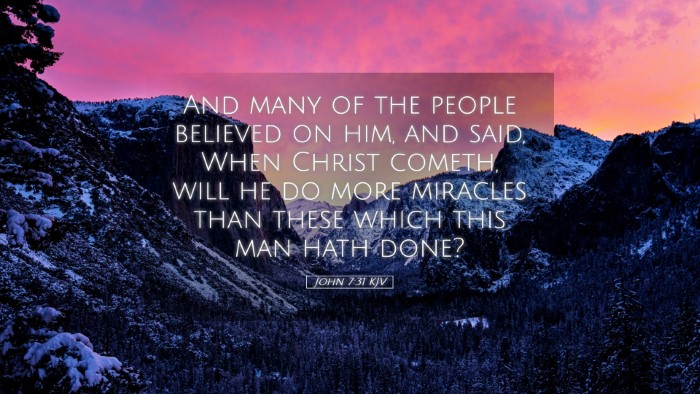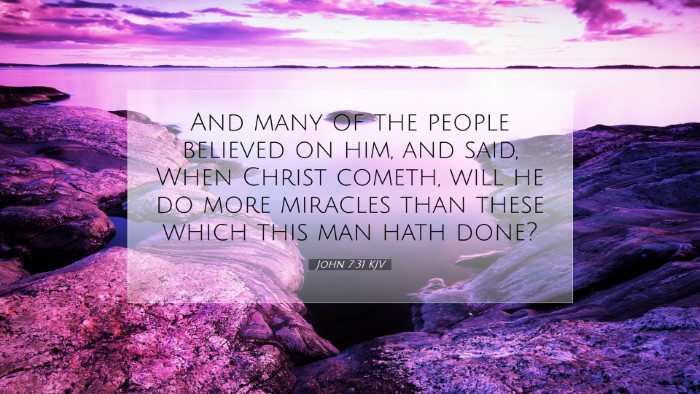Commentary on John 7:31
John 7:31 reads: "And many of the people believed on him, and said, When Christ cometh, will he do more miracles than these which this man hath done?" This verse is pivotal in understanding the growing belief among the people concerning Jesus Christ, even amidst the skepticism and conflict surrounding his ministry.
Overview of the Context
In this chapter, Jesus has been teaching at the Feast of Tabernacles, a major Jewish festival. His words and deeds have stirred a range of responses, from curiosity to outright rejection. The conflict with religious authorities is escalating, as they see Jesus as a threat to their power and influence.
Insights from Public Domain Commentaries
Matthew Henry's Commentary
Matthew Henry emphasizes the remarkable faith that begins to emerge among the people. He notes that many were captivated by the miraculous works of Jesus, which led them to contemplate whether any future Messiah could surpass what they had witnessed. Henry suggests that this points to the validation of Jesus' authority and the divine backing of his mission.
According to Henry, the inquiries of the people reflect their expectation of the Messiah’s signs. They seem to acknowledge Jesus’ miracles as genuine manifestations of divine power. However, their faith is also mixed with doubt, indicative of the tensions between popular and religious opinion.
Albert Barnes' Notes on the New Testament
Barnes elaborates on the nature of belief expressed in this verse, recognizing it as both an acknowledgment of Jesus' works and a deeper theological inquiry into his identity as the Messiah. He highlights the fact that many began to believe in Jesus, acknowledging that their belief was not merely emotional but based on reasoned observation of his miracles.
Barnes also points out the significance of the phrase "when Christ cometh." This reflects the Jewish messianic hope that anticipated greater signs accompanying the Messiah. Barnes suggests that their expectation serves as a backdrop to understanding Jesus' mission, indicating a yearning for a savior who would not only perform wonders but also fulfill prophetic promises on a grander scale.
Adam Clarke's Commentary
Adam Clarke brings out unique points regarding the nature of belief in this context. He highlights that the people's faith is rooted in their experience of Jesus' miracles, yet Clarke also examines the mixed motivations behind their belief. Some were genuinely seeking the Messiah, while others might have been driven by mere curiosity about his miraculous power.
Clarke also comments on the contrast between the people's belief and the skepticism of the religious leaders. He interprets this divergence as a critical reflection on spiritual blindness among those who should have recognized the Messiah in their midst. He emphasizes that true belief results from a heart open to the divine, which was lacking among many of the religious authorities.
Theological Implications
The belief expressed in John 7:31 has profound theological implications. It marks a significant moment in the narrative of John's Gospel—indicating a recognition of Jesus' unique authority as the potential Messiah. This verse raises vital questions concerning faith: What constitutes true belief? Is it simply based on signs and wonders, or is it rooted in a deeper relationship with God?
- The Nature of Belief: This verse challenges readers to consider the depth of their faith. Are we believing in Jesus for who he is, or merely for what he can do for us?
- Expectation of the Messiah: The people's expectation serves as a reminder of how our preconceptions can influence our understanding of Jesus. It encourages believers today to align their expectations with biblical revelation rather than cultural or personal biases.
- Contrast with Religious Leaders: This passage illustrates the importance of humility and openness to God’s work in unexpected forms. Readers are urged to remain vigilant against spiritual pride that may obstruct recognizing Jesus' authority and message.
Conclusion
John 7:31 serves as a rich text for contemplation on faith, expectation, and the nature of miraculous signs. As many in the crowd began to believe based on Jesus' miracles, this moment captures the tension between faith and doubt, openness and skepticism. The insights from commentators like Matthew Henry, Albert Barnes, and Adam Clarke contribute to a broader understanding, inviting pastors, students, theologians, and scholars to delve into the complexities of belief in Christ. This call to faith echoes through the ages, urging us all to respond to the revelations of God in our midst today.


